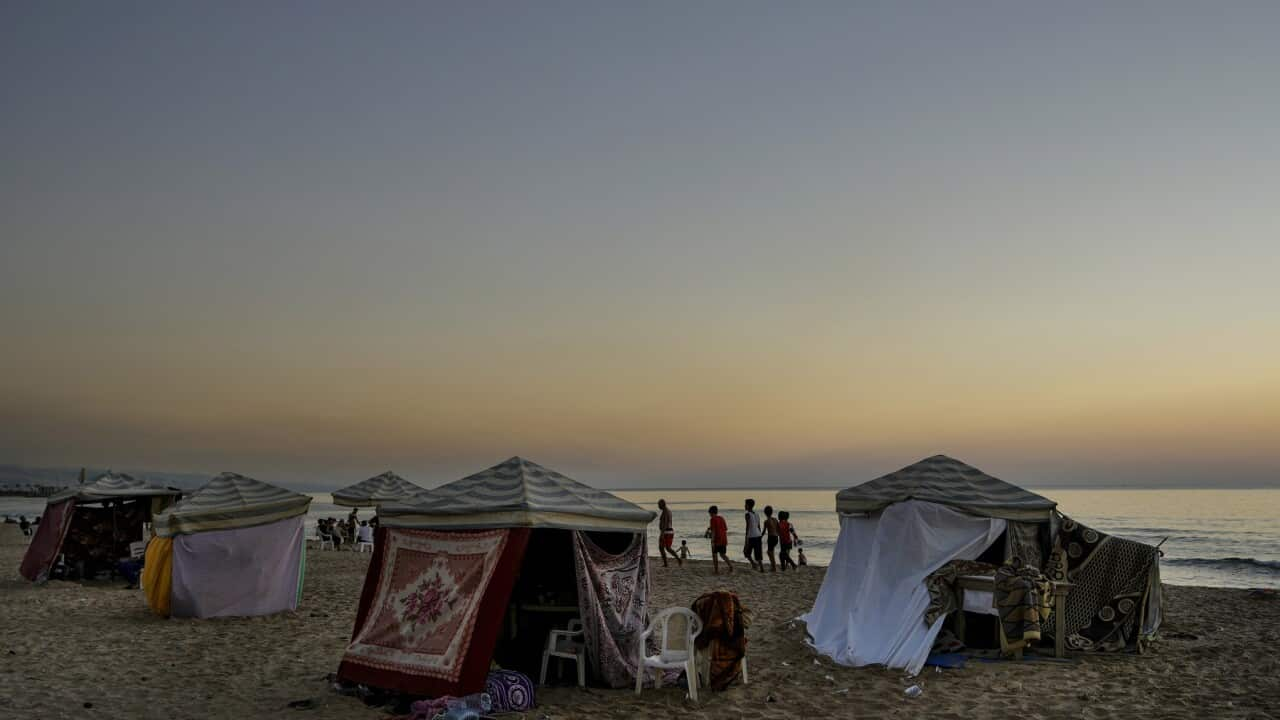TRANSCRIPT
A year on from the Hamas October 7 attack that marked a dramatic escalation in the Middle East conflict - and there is no end in sight.
In a video directly addressing residents in Lebanon, Israeli Prime Minister Benjamin Netanyahu says Israel is expanding its week-long ground offensive in southern Lebanon, with the addition of thousands more troops in a new zone in southwest Lebanon.
He also claimed Israel's army has killed two unnamed successors to the man who led Hamas for 32 years, Hassan Nasrallah, who was killed by an Israeli airstrike in Beirut late last month [[27 September.]]
"Israel withdrew from Lebanon 25 years ago. But the country that actually conquered Lebanon is not Israel. It's Iran. Iran, which finances and arms Hezbollah to serve Iran's interests at Lebanon's expense...We've degraded Hezbollah's capabilities. We took out thousands of terrorists, including Nasrallah himself, and Nasrallah's replacement and the replacement of his replacement. Today, Hezbollah is weaker than it's been for many, many years...I say to you, the people of Lebanon, free your country from Hezbollah so that this war can end."
The Israeli army says it could not confirm remarks from Israeli Defence Minister Yoav Gallant that named Hashem Safieddine as probably dead.
Hezbollah has not confirmed any new deaths among its senior commanders.
Before the release of Mr Netanyahu's video, Hezbollah's deputy leader, Naim Kassem, issued a defiant televised statement of his own - declaring the group's military capabilities to still be intact.
"A year has passed since the October 7 attack. This was an unusual event, it was an exceptional event. I can say that it was the beginning of the change to the face of the Middle East."
He says supports attempts to secure a truce - and for the first time, he did not mention the pre-condition of an end to the fighting in Gaza before combat is halted in Lebanon.
"Once a ceasefire is established, and diplomacy intervenes, everything else will be discussed and all decisions will be made. Do not ask for details when the principle has not been discussed. There is no room for any talks without a ceasefire."
Iran's Foreign Minister, Abbas Araghchi, says Iran will continue to support its allied militant groups in the region - like Hezbollah.
He vowed what he called a crushing response to any Israeli attacks against his country.
"We advise the Zionist regime not to test the willpower of the Islamic Republic of Iran. If any attack is carried out against our country our response will be more powerful than before."
The United Nations says the number of displaced in Lebanon has increased drastically - from 110,000 displaced over the past 11 months of cross-border exchanges between Israel and Lebanon, to some 1.2 million.
In the last fortnight alone, the number of those fleeing across the border from Lebanon into Lebanon is 400,000.
Lebanon's government says of that number, 75 per cent are Syrians.
Um Ali was among those who fled on foot, after a major highway to the border was bombed.
"There were bombings and airstrikes and so we escaped. Thank God we arrived here safe and sound. We don’t know what happened to it. If it’s still bombed or not. We managed to get our documents and escape. We’ve been on the streets in Lebanon for the last two days. Thank God we’re here now."
The UN's refugee agency, UNHCR, says there are concerns for the safety of Syrians who were driven out of their homeland by 13 years of war and who are now being forced to return to Syria.
United Nations High Commissioner for Refugees, Filippo Grandi, has now concluded a visit to the Syria-Lebanon border - which also included meetings with officials in Damascus to seek assurances that the safety of returning Syrians is respected.
"This has been since September 23, 24, the main entry point for people arriving from Lebanon. Many of these people are Syrian refugees who were in Lebanon about 70 per cent, and 30 per cent approximately are Lebanese, Lebanese refugees that are fleeing from Lebanon because of the situation. There are also other nationalities - Palestinians, Sudanese and other people that have fled."
Meanwhile, in the Gaza Strip, paediatrician Nasser Balbul has been working in Nuseirat refugee camp, after being forced to relocate multiple times with his medical team.
He says he finds little to smile about these days, but saving the life of a baby girl is one of those rare moments.
"Malak faces an uncertain future. A nurse has adopted her. We don't know if her parents are alive or if they were killed during the conflict. They'll try to find her mother and father. If they fail, the nurse will raise her. Of course, the future's uncertain for all the children who’ve lost their parents. They need urgent help now, as well as after the fighting ends."
He says fighting to save the lives of newborns in a warzone has been beyond challenging - and his fervent wish is for peace.
"We've not experienced a tragedy on this scale before. As for peace, we’ve actually forgotten what it is. There's no such thing as peace anymore. There's still hope the war will end, and we can continue our work and things will get better, and the children's situation will improve. But without international and Arab support, it'll be hard for us to get back on our feet."













